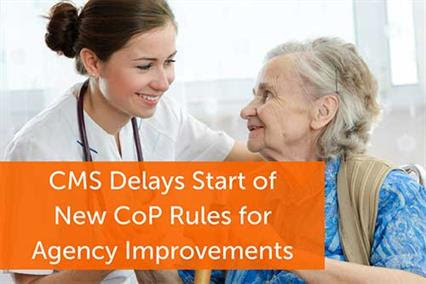In March, CMS announced the final rules for the new Conditions of Participation (CoP) for home health agencies. In development for nearly three years, the new CoPs marked the first significant update of the rules since 1997. These new CoPs were set to go into effect on July 13, 2017, but CMS recently announced that home health agencies would have an additional six months to comply with the new regulations. The new effective date is January 13, 2018.
New CoPs in a Nutshell
The CoPs for home health agencies can be found in a new 374-page document, accessible on the Federal Register and CMS website. The document contains a simplification of administrative requirements as well as updated definitions of key terminology, new infection control, and assessment guidelines. Most of the new rules are focused on requirements for home health personnel, clarifying patient rights and the HHA’s role in ensuring they are maintained, care coordination, and improving the quality of care. For example, some of the new requirements include:
- A clear explanation of patient rights and the steps an HHA must take to ensure those rights are maintained. This includes a requirement that patients and their caregivers receive written information about care plans and instructions for medication, as well as a detailed schedule of upcoming visits and information about their home health providers and the HHA clinical manager.
- • A requirement to provide a licensed clinical provider to manage patient care needs, including patient referrals and care plan development and follow through. This also includes active and ongoing communication with the patient’s health care providers.
- • HHAs must have an ongoing agency-wide quality assessment and performance improvement (QAPI) program in place to collect and analyze data while they continuously monitor and improve patient care. This particular requirement was already scheduled to go into effect on January 13, 2018, and that deadline has been extended to July 3, 2018.
Although many agencies have already been working toward meeting these requirements, for some, meeting the new requirements presents a significant challenge. In fact, despite the length of time that the rules were under review, there was great concern among agencies and industry groups that the July deadline for implementation was too ambitious.
Lobbying for an Extension
According to the CMS bulletin announcing the delay in the effective date, after the March 31, 2017 announcement of the new CoPs, a number of agencies responded with specific concerns about the rules. Among those concerns was the need for additional guidance on several provisions of the new rules. More specifically, agencies requested waiting until CMS released the revised version of the Interpretive Guidelines. And for the more than 200 agencies that would be affected by the new rules to convert sub units of agencies into branches or independent agencies, CMS needed to issue sub-regulatory guidance.
Cost was also a factor in many agencies’ concerns about the short implementation time. Because of the significant staffing, resource allocation, and infrastructure changes required by the new rules (such as implementing new home health management software), the cost of the new CoPs is expected to be significant. CMS calculated that the cost of the new rules could reach up to $293 million for some agencies in the first year, with an annual cost of $290 million in following years. A number of agencies object to these costs, noting that they were not prepared to allocate resources in such a manner right away.
Changes to Administrative Requirements
Another aspect of the new rules that was concerning to agencies is the new requirement for directors of home health agencies who are hired after the effective date of the new rules to have a bachelor’s degree, be a registered nurse, or a licensed physician, even if that administrator served as a leader at another agency. The registered nurse requirement also includes nurse practitioners and other advanced practice nurses.
This new requirement for HHA administrators was initially to begin on July 13, with those already in administrative positions on that date grandfathered in. However, this date was also changed to January 13, 2018, meaning that administrators hired within the next six months do not have to meet this education requirement. Administrators hired after January 13, 2018, must meet the education requirements and have at least one year of experience in a supervisor role in home health care or related field.
While the change to the start date of the new Conditions of Participation has some agencies breathing a sigh of relief, there is still work to do. If you have not yet begun efforts to implement a QAPI program or meet other requirements, now is the time to do so. To learn more about Complia Health’s software solutions that can help you comply with the new CMS guidelines and run your agency more efficiently, click here.




